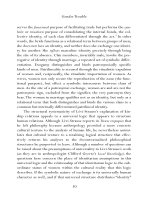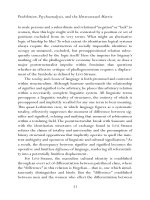GENDER TROUBLE 146
Bạn đang xem bản rút gọn của tài liệu. Xem và tải ngay bản đầy đủ của tài liệu tại đây (20.38 KB, 1 trang )
Subversive Bodily Acts
as the site of an irretrievable self-loss? Kristeva clearly takes heterosexuality to be prerequisite to kinship and to culture. Consequently, she
identifies lesbian experience as the psychotic alternative to the acceptance of paternally sanctioned laws. And yet why is lesbianism constituted as psychosis? From what cultural perspective is lesbianism
constructed as a site of fusion, self-loss, and psychosis?
By projecting the lesbian as “Other” to culture, and characterizing
lesbian speech as the psychotic “whirl-of-words,” Kristeva constructs
lesbian sexuality as intrinsically unintelligible. This tactical dismissal
and reduction of lesbian experience performed in the name of the law
positions Kristeva within the orbit of paternal-heterosexual privilege.
The paternal law which protects her from this radical incoherence is
precisely the mechanism that produces the construct of lesbianism as a
site of irrationality. Significantly, this description of lesbian experience
is effected from the outside and tells us more about the fantasies that a
fearful heterosexual culture produces to defend against its own homosexual possibilities than about lesbian experience itself.
In claiming that lesbianism designates a loss of self, Kristeva
appears to be delivering a psychoanalytic truth about the repression
necessary for individuation. The fear of such a “regression” to homosexuality is, then, a fear of losing cultural sanction and privilege altogether. Although Kristeva claims that this loss designates a place prior
to culture, there is no reason not to understand it as a new or unacknowledged cultural form. In other words, Kristeva prefers to explain
lesbian experience as a regressive libidinal state prior to acculturation
itself, rather than to take up the challenge that lesbianism offers to her
restricted view of paternally sanctioned cultural laws. Is the fear
encoded in the construction of the lesbian as psychotic the result of a
developmentally necessitated repression, or is it, rather, the fear of losing cultural legitimacy and, hence, being cast, not outside or prior to
culture, but outside cultural legitimacy, still within culture, but culturally “out-lawed”?
Kristeva describes both the maternal body and lesbian experience
111









